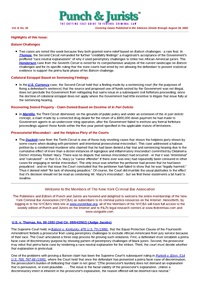The Supreme Court held, in Batson v. Kentucky, 476 U.S. 79 (1986), that the Equal Protection Clause of the Fourteenth Amendment forbids a prosecutor from using peremptory challenges to exclude African-Americans from jury service because of their race. The Court articulated a three-step process for proving such violations. First, …
Defendant was not denied full access to an FBI file on a government witness under Brady, where any evidence potentially favorable to defendant was disclosed in time for him to make use of the information. A Travel Act conviction was proper.
Here after the 9th Circuit held that the district court had erred by dismissing, on the grounds of absolute immunity, a civil rights suit against prosecutors for malicious prosecution, the court again dismissed the action based on qualified immunity.
Plaintiff criminal defense attorney, brought action against defendant government …
The two defendants in this case were convicted at trial of various drug offenses. At sentencing, the district court applied a four-level enhancement to defendant one, as an organizer or leader pursuant to U.S.S.G. § 3B1.1(a); and a two-level enhancement to the second defendant for his lesser aggravating role …
Both of the Appellants in this case were convicted of four counts of possession of a firearm during and in relation to a crime of violence. 18 U.S.C. § 924 (c)(1)(A) imposes a minimum sentence of five years for this offense. For a second or subsequent conviction under § …
Although a single 360-month sentence for conspiracy exceeded the applicable statutory maximum, such error was harmless under Apprendi where the district court could have sentenced defendant to consecutive terms totaling 360 months.
The defendant in this case was convicted of various conspiracy and substantive drug crimes; and he …
The appellant in this case, Eduardo Mantilla, was convicted in 1992 of three counts of conspiring to import, possess and distribute large quantities of drugs in violation of 21 U.S.C. §§ 846 and 963; and he was sentenced to life imprisonment. Mantilla was arrested after he and some confederates …
The defendant in this case was convicted of unlawful possession of a firearm under 18 U.S.C. § 922(g)(9), which make sit unlawful for a person convicted of domestic violence to possess firearms or ammunition. On appeal, he argued that his prior conviction under a D.C. statute for general assault …
Here the Court held that a finding made by a sentencing court that the source and proposed use of funds seized by the Government was not illegal did not preclude the Government from relitigating that same issue in a subsequent forfeiture proceeding.
This case addressed an increasingly important …
In 1987, the petitioner in this case, Demetrius Henderson, was convicted of kidnapping, raping and murdering a 16-year old victim. Ever since then, he has been attempting to convince the courts that the prosecutor used some of his peremptory challenges in a manner that violated the teachings of Batson …
Here, following its earlier ruling reported at 207 F.Supp.2d 856, the Court denied the defendant's motion in limine to exclude expert testimony regarding footwear impression evidence, holding that the methodology employed was sufficiently reliable.
The defendant was charged with bank burglary. In an earlier proceeding reported at 207 …
Although a district attorney's "inappropriate" commentary at trial was intentional and calculated, a habeas petitioner could not show that prosecutorial misconduct so infected the trial as to make the proceeding
fundamentally unfair.
This case is a farce. In 1988, the petitioner, Robert Don Duckett, was convicted of first-degree …
